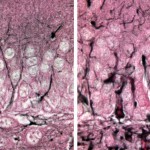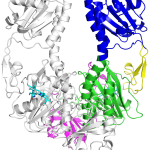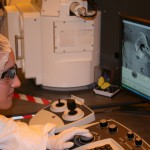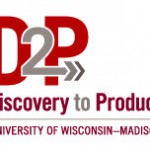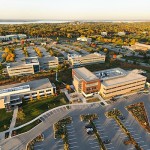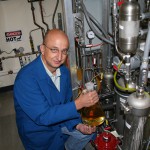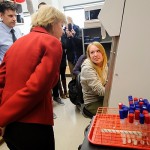Tag Research
Rare disease yields clues about broader brain pathology
Alexander disease is a devastating brain disease that almost nobody has heard of — unless someone in the family is afflicted with it. Alexander disease strikes young or old, and in children destroys white matter in the front of the brain. Many patients, especially those with early onset, have significant intellectual disabilities. Read More
Connection found between nitrogen levels in water and toxic algae production
Scientists have long known that phosphorus fuels growth of algae in lakes and streams. Wisconsin Sea Grant researchers have found that nitrogen levels are a factor in whether or not these algae – specifically, blue-green algae –produce toxins. The findings, published in PLOS ONE have parts of the scientific community buzzing. Read More
New technology could help food crops thrive in crowded fields
With the global population expected to reach 9 billion by 2050, the world's farmers are going to need to produce a lot more food - but without using much more farmland, as the vast majority of the world's arable land is already being used for agriculture. Read More
Speaker to share how distrust contributes to poverty
Many of the issues associated with poverty in the United States are obvious, such as unemployment, single-parent families and declining wages for less-educated workers. But Temple University sociologist Judith Levine uncovered another, less obvious issue that contributes to poverty: distrust. Read More
Impulsivity, rewards and Ritalin: monkey study shows tighter link
Even as the rate of diagnosis has reached 11 percent among American children aged 4 to 17, neuroscientists are still trying to understand attention deficit hyperactivity disorder (ADHD). One classic symptom is impulsivity — the tendency to act before thinking. Read More
Program connects community college instructors in high-tech fields
The National Science Foundation's Advanced Technological Education (ATE) program has given thousands of community college instructors the resources to develop new courses, provide professional development opportunities, and create industry-based internship programs - all with a focus in high-tech fields that produce particularly rosy employment prospects for well-trained graduates. Read More
Researcher says for 2-year-olds, touch screens may trump TV
Smartphones and tablets may be better learning tools for toddlers younger than 2 1/2 years old than "Sesame Street" and other educational TV programs, according to a researcher in the University of Wisconsin–Madison School of Human Ecology. Read More
Mentors help inventors make the leap to entrepreneur
It’s a story that could become a company’s founding narrative. The two Steves built their first Apple computer in the garage. Bill Gates dropped out of Harvard to start a software company. And 4-year-old Patrick Heaney broke a plastic sword while play-fighting — and recognized that materials can always stand improvement. Read More
New look identifies crucial clumping of diabetes-causing proteins
People get type 2 diabetes. So do cats. But rats don’t, and neither do dogs. Subtle differences in the shape of proteins protect some and endanger others. Read More
Lead exposure dooms some Wisconsin kids to struggle in school
Two studies funded by the Wisconsin Partnership Program paint a grim reality for Wisconsin children exposed to lead before age 3. Read More
Vet med scientists find better, safer treatments for hoof disease in cattle
For almost 40 years, digital dermatitis has plagued cattle throughout the world. Also called heel warts, these painful hoof lesions limit the amount of time cows can stand and feed, which can hinder animal welfare and food production. The disease can be found on almost every beef and dairy farm in North America, so it has a significant economic impact on those industries in the United States. Read More
Discovery sheds light on how changes in lungs can hurt the heart
A team of University of Wisconsin–Madison researchers has discovered important biomechanical changes in human arteries that could increase understanding of how pulmonary hypertension leads to heart failure. Read More
Hyer assumes leadership as University Research Park continues to grow
With last Friday's retirement of longtime University Research Park Director Mark Bugher, associate director Greg Hyer is assuming the role of interim director of the successful, 260-acre park on the West Side of Madison. Read More
Mackie’s goal: use what we’ve learned to help humanity
The Wisconsin Institute for Discovery's monthly Tools for Discovery profile features Rock Mackie, director of the medical devices research group at the Morgridge Institute for Research. Read More
Study challenges prevailing view of invasive species
Zebra mussels. Asian carp. Kudzu. Chances are you recognize these names as belonging to invasive species - plants or animals that are relocated from their native habitat to a foreign land, only to prove so prolific that they take over their new home. Except that's not how the story usually goes, according to a new study. Read More
Wisconsin has numbers in federal budget talks
No fewer than three members of Wisconsin’s Congressional delegation are among 29 representatives and senators tasked with resolving differences between the two houses on the federal budget. Read More
H5N1 bird flu genes show nature can pick worrisome traits
In a study published today (Oct. 23, 2013) in Nature Communications, an international team of researchers shows how evolution can favor mutations that make avian flu more transmissible in mammals. Read More

